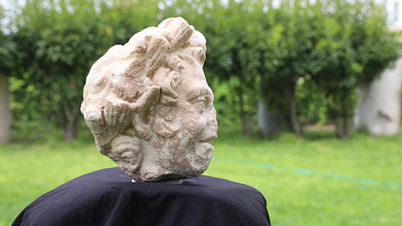A small fish that lives in shallow waters in Myanmar has impressed scientists with its ability to produce sounds up to 140 decibels.
The fish Danionella cerebrum makes loud sounds using its swim bladder and other organs. Video : NewScientist
Danionella cerebrum , a small fish with a body length of no more than 12 mm, produces sounds of up to more than 140 decibels, IFL Science reported on February 28. Meanwhile, a sound of 150 decibels can be strong enough to rupture eardrums. The loudest sound ever recorded on Earth was the Krakatoa volcano eruption, which reached 172 decibels at a distance of up to 160 km. The new study was published in the journal PNAS.
"This tiny fish can produce sounds above 140 decibels at a distance of 10-12 mm, which is comparable to the noise a human would hear when an airplane takes off at a distance of 100 m and is very unusual for such a small animal," said Dr. Ralf Britz at the Senckenberg Natural History Collection.
To find out how they make their loud sounds, the team used high-speed video combined with gene expression and found that males possess a unique set of sound-producing elements including specialized ribs, “drumming” cartilage, and strong, fatigue-resistant muscles.
The team discovered that the sound is produced by vibrations in the swim bladder, in which the muscles contract, causing structures to hit the swim bladder. Unlike other fish that use a similar method to produce sound, Danionella cerebrum may use repetitive muscle contractions on one side of its body. This mechanism has not been documented in any other fish.

The fish has a transparent body and makes super loud sounds. Photo: Senckenberg/Britz
Danionella cerebrum has two vocal muscles containing cartilage that beat their drums. Contracting the muscles moves the ribs. This pulls the cartilage together, creating tension. When released, the cartilage hits the bladder, making a loud noise.
In the wild, Danionella cerebrum lives in shallow waters in Myanmar, which are often opaque, making it difficult to see other fish around them. Therefore, the team believes they have developed this method of communication. They are also of interest in the field of biomedical research because of their transparent bodies.
Thu Thao (According to IFL Science )
Source link






![[Photo] General Secretary To Lam and National Assembly Chairman Tran Thanh Man attend the 80th Anniversary of the Traditional Day of the Vietnamese Inspection Sector](https://vphoto.vietnam.vn/thumb/1200x675/vietnam/resource/IMAGE/2025/11/17/1763356362984_a2-bnd-7940-3561-jpg.webp)










































































































Comment (0)